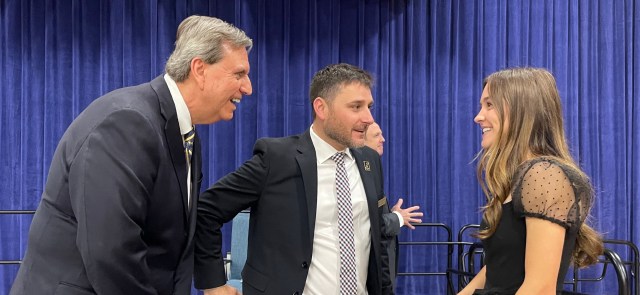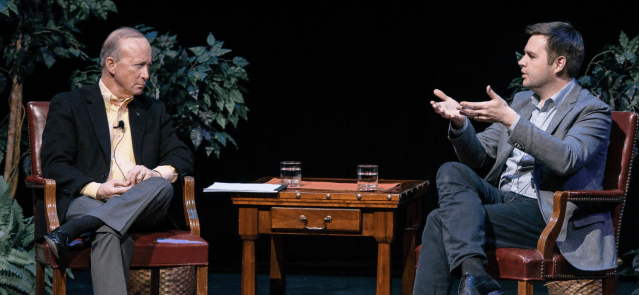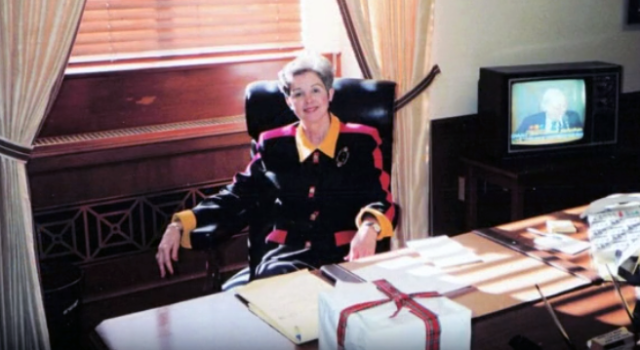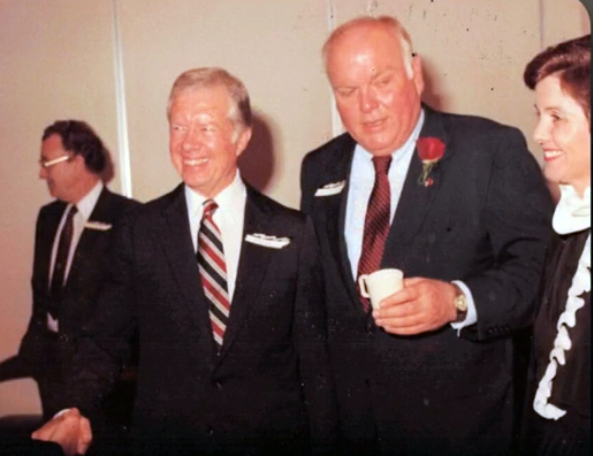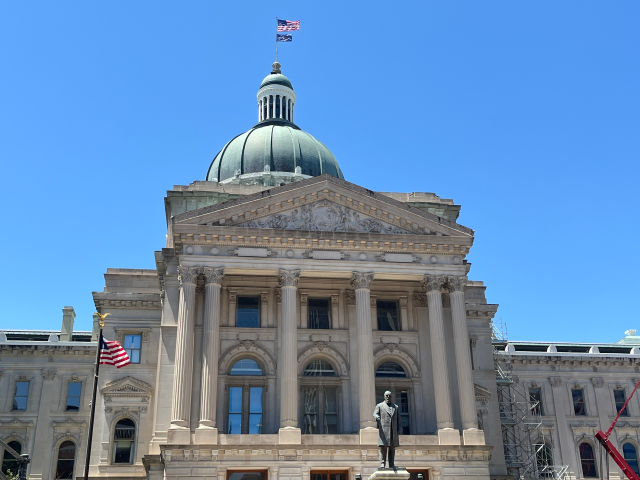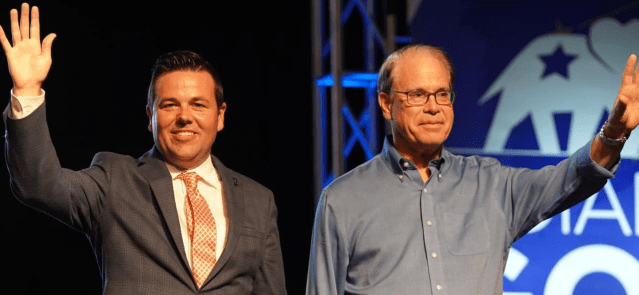In past election cycles, once a gubernatorial ticket forms, the lieutenant governor nominee is folded into the campaign.
Asked if Micah Beckwith has been integrated into the Mike Braun for Indiana campaign, the gubernatorial nominee’s camp told Howey Politics Indiana: “Sort of.”
The two nominees have met since Beckwith won the nomination over Braun’s choice of state Rep. Julie McGuire last month. The Braun campaign website hasn’t incorporated Beckwith into its logos, although the Noblesville pastor posted a logo with both of their names on his X page. He has not yet been conspicuously featured as the running mate. The Braun campaign signaled it will not attempt to rein in Beckwith, who has sometimes stirred controversy.
Beckwith continues to co-host his “Jesus, Sex + Politics” podcast with fellow Pastor Nathan Peternel. In the June 28 episode, Beckwith took on IndyStar columnist James Briggs, who called him “scary” in a June article.
The podcast raised this question: How scary is Micah Beckwith really?
“Probably to a guy like James Briggs I am really scary,” Beckwith responded. “Guys like James Briggs want to mutilate children, put pornographic material in the hands of children. They hate anything of traditional values. They want to murder babies. I’m against that.”
The podcast then addressed whether Beckwith is a “Christian nationalist.”
“Christian nationalism, and the reason I stick by my guns, is that I’m a Christian and I love my nation,” Beckwith said. “James Briggs hates Christianity and he hates America. That’s why he doesn’t like that.
“They try to use it to say, oh my gosh, I’m going to shove religion down everyone’s throats,” Beckwith continued. “Foolish people like James Briggs buy into that argument really, really easily. No one in conservative circles I run in have I ever heard anyone say, ‘We want a theocracy.’ We are a constitutional republic rooted in Judeo-Christian principles, and the thing that Mr. Briggs forgets is that his blessings of freedom come from those Christian principles he hates so much and wants to attack.
“The left likes to take words and redefine words,” Beckwith said. “They redefine ‘women’; they redefine ‘gender.’ So I am not going to let him redefine ‘Christian’ and ‘nationalism.’ Both are very good things. We should all have love for our nation and we should all love the Judeo-Christian principles.”
Peternel asked, “Does that make you a heinous, evil sociopath that needs to be destroyed?”
Beckwith responded, “According to the IndyStar, yes.”
They switched to the topic of gender transition.
“You are against the cutting off of the genitals of children?” Peternel asked Beckwith.
“I am,” he responded. “The reason the IndyStar sees me as a threat, and they should, is that they want to enact things that are just plain wicked, and I’m not going to let them do it. I’m going to fight them. I’ll fight them in the hills; I’ll fight them in the streets; I’ll fight them everywhere we can. I’m not backing down on this because we are right and they are on the side of wrong. It’s OK to be an embarrassment to the left.”
As for Democratic lieutenant governor nominee Terry Goodin, Beckwith said, “He used to be a pro-life, pro-2nd Amendment, pro-traditional marriage Democrat, and he had to come out at his press conference. He had to backpedal so much he might as well have turned the bike around and rode it the other way. There is no place for anyone in the Democratic Party if you believe that life begins at conception, if you believe marriage is between a man and a woman and if you believe you have a right to defend yourself with the 2nd Amendment. They say I’m the extremist. No, no, no, you guys have become the radical Marxist extremists.”
The episode then turned to Beckwith’s tenure on the Hamilton East Public Library Board.
“As far as the Hamilton East Public Library Board, the stuff that was falling into the hands of children, I haven’t found one radical leftist, when I showed them this stuff that was in the kids section, they could honestly say that should be allowed in the kids section,” Beckwith said. “If you’re a radical leftist listening to this, come to church and I’ll show you some of these pictures and I’ll get you on video saying, ‘Yes, these are OK for children.’”
Then Beckwith addressed his statement following the Jan. 6, 2021, U.S. Capitol insurrection.
“The more people I talk to about the Jan. 6 stuff, the more they are realizing how much of a scam that was,” he said. “What the Lord was saying to me at that moment was they mocked His name.”
He cited a prayer by a congressman from Missouri that opened the congressional session on Jan. 3 as the first time the name “Jesus Christ” was not invoked. Instead, Beckwith said, “the name of a demonic spirit” named “Bramma” was invoked.
“What the Lord told me was, ‘Those rioters were a direct result of you, America, mocking my name,’” Beckwith said. “I didn’t like what I saw on Jan. 6, but I will say this, too: That was a pretty soft spanking.”
4 Democratic candidates for lieutenant governor
Three little-known candidates have filed to challenge Democratic gubernatorial candidate Jennifer McCormick’s pick of former state Rep. Terry Goodin as her running mate at next week’s state party convention.
Those candidates met Monday’s filing deadline with the state Democratic Party, with their paperwork being reviewed for fulfilling qualifications ahead of the July 13 convention, party spokesman Sam Barloga said.
Besides Goodin, those who filed are 2022 state Senate candidate Tamie Dixon-Tatum of Anderson, perennial candidate Bobby Kern of Indianapolis and community activist Clif Marsiglio, who ran in the 2023 Democratic primary for Indianapolis mayor.
Wells, White seek attorney general nod
Indiana Democratic Party delegates will choose between two candidates for the party’s attorney general nomination at their July 13 convention. Destiny Wells, a defense attorney and U.S. Army Reserve officer who ran unsuccessfully for Indiana secretary of state in 2022, and Beth White, former Marion County clerk and president of the Indiana Coalition to End Sexual Assault & Human Trafficking, are vying for the nomination.
Wells entered the race in November, while White joined in January. Both are seeking to unseat Republican Attorney General Todd Rokita, who is running for reelection. Rokita, whose office has championed socially conservative causes such as the fight against abortion access, is a primary target for state Democrats in 2024.
Wells said she was asked by several Republicans and Democrats to run against Rokita. She was not expecting a Democratic opponent, she added.
“Having an opponent has been a valuable experience, pushing me to become a stronger candidate,” Wells said. “I’ve been proud to campaign each day, engaging with delegates and presenting Hoosiers with my history of leadership in both the public and military sectors.
“Delegates are looking for a new vision to lead their state and party, and I am ready and eager to take up that mantle.”
Wells had outraised White by the end of March, ending the month with about $106,000 in her campaign account. White had about $32,000.
Lake County Democrats endorse Wells
The Lake County Democratic Party held a meeting to consider a unanimous recommendation from the city and town chairs to endorse Destiny Wells for attorney general.
Michelle Fajman, vice chair of the Lake County Democratic Party, who chaired the meeting, stated, “The Lake County Democratic Party intends to report this decision to the delegates attending the Democratic State Party Convention in Indianapolis on July 13th to encourage all the delegates to consider supporting Destiny Wells as the Democratic nominee for Attorney General. Destiny Wells is clearly our best choice to defeat Todd Rokita in the Fall.”
Governor
Indiana Debate Commission contacts campaigns
The Indiana Debate Commission has approached the gubernatorial campaigns of Democrat Jennifer McCormick, Republican Mike Braun and Libertarian Donald Rainwater about a late-October debate, according to Kelly Wittman, McCormick’s campaign manager.
Wittman said “multiple dates” have been proposed beginning Oct. 18. “I’m sure one of those dates will work,” she said.
Wittman previously told Howey Politics Indiana that the McCormick and Braun campaigns had agreed to two non-Indiana Debate Commission debates on Oct. 2 and Oct. 3, sponsored by WISH-TV and Fox 59/CBS 4, respectively.
Rainwater accepts 3 debates
Libertarian gubernatorial nominee Donald Rainwater said he accepted an invitation from the Indiana Debate Commission for a moderated debate.
“I have accepted the invitation, and look forward to hearing that Mike Braun and Jennifer McCormick have done the same,” Rainwater said in a statement.
He also agreed to the WISH-TV and Fox 59/CBS 4 debates on Oct. 2 and 3.
Large donations
Large donations posted on the Indiana Election Division website include:
Jennifer McCormick: Nicholas Slater, $5,000 (July 8); Donald Westerhausen Jr., $1,000 (July 8); Michael Doran May, $1,000 (July 8); Dan Beaty, $1,000 (July 8); Morris Erickson, $1,000 (July 8); Noah Smith, $10,523 (June 28); Ann M. Stack, $20,000 (June 19).
Mike Braun: Gary Neidig, $2,500 (July 7); Nisource PAC, $5,000 (July 6); Goecker Construction, $2,000 (July 7); James Hodge, $1,000; Indiana Muslin PAC, $2,500; John Smith, $10,000 (July 2); George Daniels, $3,300 (July 2); Carol Dozier, $1,000 (July 2); Isoclima Specialty Glass, $1,000 (July 2); Roger Penske, $50,000 (July 2); Devin Anderson, $10,00 (June 29); Trucking Industry PAC, $10,000 (July 2); BLB St. John, $25,000 (June 29); DPBG PAC, $10,000 (June 29); Fadness for Fishers, $10,000 (June 29); Friends of Indiana Hospitals, $10,000 (June 29); Curtis Creek Daily, $35,000 (June 29); Peter Hawryluk, $10,000 (June 29); Ice Miller PAC, $10,000 (June 29); Bose McKinney & Evans, $50,000 (June 29); William Barrett, $10,000 (June 29); James Stevens, $15,00 (June 26); Chris Baggott, $10,000 (June 26); Chris Jensen, $10,000 (June 24); Charter Communication, $10,00 (June 30); Indiana Realtors PAC, $100,000 (June 30); Harold Antonson, $10,000 (June 30); Rick James, $25,000 (June 30); John Lecheiter, $25,000 (June 30); BLB St. John, $65,000 (June 30); Faegre Drinker Biddle & Reath, $50,000 (June 30); Richard Byers, $15,000 (June 30); Anthony Samuel ,$10,000 (June 30).
There were no large donations for lieutenant governor nominees Micah Beckwith or Terry Goodin.
Congress
1st CD: Niemeyer seeks 3 debates
Republican Lake County Councilman Randy Niemeyer issued a statement inviting his opponent, U.S. Rep. Frank Mrvan, to three debates across the district ahead of early voting on Oct. 8.
“As we approach a critical election, the voters in Indiana’s First District deserve to have a clear understanding of where each candidate stands on the most pressing issues facing our country,” Niemeyer said in a statement. “In the spirit of openness and transparency, I invite my opponent, Congressman Frank Mrvan, to three debates — one in each county of our district — before early voting begins on October 8th.”
Presidential
RFK Jr. close to qualifying
Robert F. Kennedy Jr. is another step closer to becoming the first independent presidential candidate on Indiana’s election ballot in over two decades. County election officials have certified enough petition signatures from his presidential campaign for his name to appear on the November ballot.
The Kennedy campaign must still file the petitions with the state Election Division by July 15, but unofficial tallies submitted by county offices show the signatures of nearly 39,000 registered voters had been certified as of Tuesday morning. State law requires at least 36,943 certified signatures for independent and minor-party candidates to qualify for the statewide ballot.
Kennedy’s campaign says it has met the requirements for his name to appear on the ballot in at least 27 other states, although not all have affirmed ballot placement. His campaign says it has an aggressive ballot access operation with a $15 million budget aimed at getting Kennedy on the ballot in all 50 states and the District of Columbia.
Kennedy is seeking to join presumptive Democratic and Republican candidates Joe Biden and Donald Trump, respectively, and Libertarian Chase Oliver on the Indiana presidential ballot.
County officials had certified about 17,000 petition signatures from Green Party candidate Jill Stein, according to Tuesday’s report from the state Election Division.
Trump campaign issues Republican National Convention themes
Donald Trump’s presidential campaign, together with the Republican National Committee, released program themes for the “Make America Great Once Again” Convention on July 15-18, 2024, in Milwaukee.
“From the beginning of President Donald J. Trump’s campaign to Make America Great Again, we’ve received an outpouring of support from everyday Americans who are ready to turn the page on the last four years of failure, disaster, and embarrassment at home and abroad,” Trump campaign senior advisers Susie Wiles and Chris LaCivita said in a statement. “The 2024 Republican National Convention will showcase President Trump’s vision to turn our country around and launch our America First movement to victory come November.”
The following are daily themes according to a news release from the Trump campaign:
Monday: Make America Wealthy Once Again
During the first Trump administration, America experienced an unprecedented economic boom. President Trump’s America First economic policies slashed cumbersome regulations, cut tax rates and reworked trade deals to create a fairer playing field for American industry and workers. Under the Biden-Harris administration, all of this progress has stalled or reversed — real wages for American workers are lower than before Biden took office, meanwhile inflation and high energy prices thanks to the Biden’s Green New Deal-inspired, anti-drilling agenda have made everyday life unaffordable for working-class Americans. The second Trump administration will turn the page on the mindless “Bidenomics” agenda and usher in a new age of prosperity.
Tuesday: Make America Safe Once Again
Once iconic American cities and communities have become hollowed out, dystopian nightmares thanks to Joe Biden and Democrats’ “woke” soft-on-crime and open border policies. In Joe Biden’s America, unvetted illegal aliens and deranged criminals are free to roam the streets and terrorize everyday Americans, all while law enforcement is demonized. Cartels have overrun our border, flooding our neighborhoods with enough deadly fentanyl and methamphetamine to kill every American multiple times over. President Donald J. Trump will stand up for our law enforcement and put an end to the senseless crime spree and drug flow that plague America.
Wednesday: Make America Strong Once Again
Under Joe Biden, the weakest commander-in-chief in our country’s history, America has become a global laughingstock. From our dumpster fire of a southern border to the botched Afghanistan withdrawal to the Hamas-Israeli war to enabling the Iranian terrorist regime, Biden has repeatedly made the wrong move on the world stage. Under President Trump’s vision, America will once again be strong and secure and put an end to the Biden-Harris administration’s weakness. President Donald J. Trump will secure our borders, curb Chinese and Iranian threats, and restore America’s rightful standing on the world stage.
Thursday: Make America Great Once Again
President Donald J. Trump will usher in a new golden age for America. At home and abroad, America’s standing will be restored. American families will once again experience prosperity, safety, and strength. Our decaying and decrepit cities and communities will experience a resurgence. Americans will once again have reason to harbor hope and optimism for the future of our country. President Trump will Make America Great Once Again!
Senior Statehouse reporter Tom Davies contributed to this report.
Brian A. Howey is senior writer and columnist for Howey Politics Indiana/State Affairs. Find Howey on Facebook and X @hwypol.
